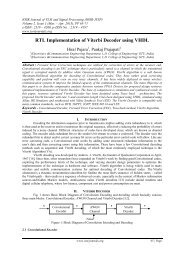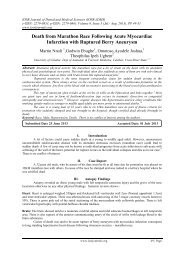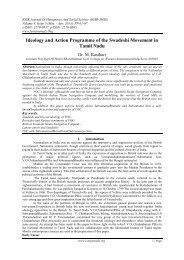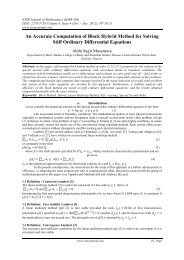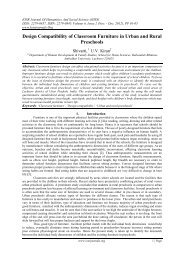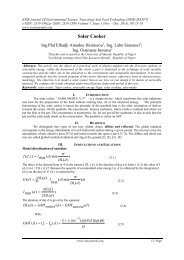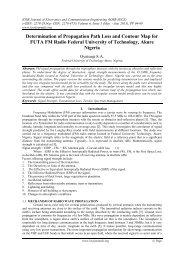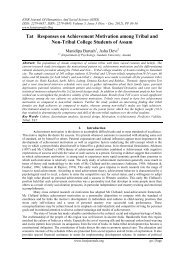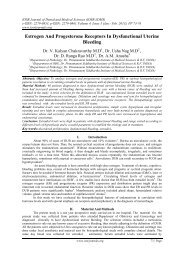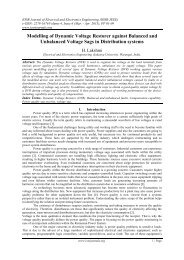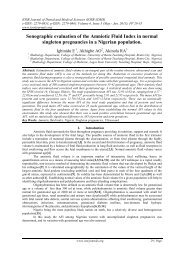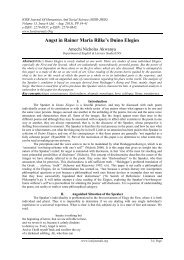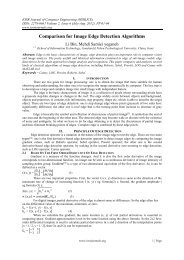Initial Conquest of India by Turks and Their Slaves - IOSR
Initial Conquest of India by Turks and Their Slaves - IOSR
Initial Conquest of India by Turks and Their Slaves - IOSR
Create successful ePaper yourself
Turn your PDF publications into a flip-book with our unique Google optimized e-Paper software.
Internal Conflicts <strong>and</strong> African Development: The Nigerian Experience<br />
One thing that is pertinent is that conflict within human society is practically unavoidable. Issues<br />
relating to conflict prevention therefore are better seen as the ways to reduce conflicts <strong>and</strong> its impact <strong>by</strong><br />
addressing those things that leads to conflict, making sure they are avoided <strong>and</strong> or designing measures to<br />
prevent escalation <strong>of</strong> latent conflicts. This can be done through solving those problems that creates anxiety <strong>and</strong><br />
pressure <strong>and</strong> consequently frustration. Nwanegbo (2005) has identified certain basic causes <strong>of</strong> conflict <strong>and</strong><br />
strategies for their resolution for Nigerian cases, <strong>and</strong> presented as follows;<br />
Democratization:<br />
Much <strong>of</strong> the causes <strong>of</strong> internal conflicts…in Africa (<strong>and</strong> in Nigeria) may be traced to the undemocratic<br />
character <strong>of</strong> the states. There is no gain saying that countries need to democratize the political system. As<br />
Obianyo (1997:11) asserts, any country that attempts to deny its citizens that singular opportunity <strong>of</strong><br />
contributing towards the political development <strong>of</strong> their nation is doomed for persistent political instability <strong>and</strong><br />
group conflicts. Nnoli (1998:18) contends that state violence accounts for the most important conflicts in<br />
Africa… <strong>and</strong> even those conflict that are associated with development, inevitably interface with state violence.<br />
Democracy goes beyond multi-party elections. It includes mutual tolerance <strong>and</strong> consensus building in the<br />
pursuit <strong>of</strong> common concerns. Hence Nwanegbo (2005a) contend that civilian regime does not necessarily mean<br />
democratic government. Unfortunately, Nnoli explains further, “the long period <strong>of</strong> military rule in Nigeria has<br />
induced a comm<strong>and</strong>ist <strong>and</strong> authoritarian culture guided <strong>by</strong> the belief that all matters are quick <strong>and</strong> effective<br />
action (also, See Adekanye, 1993). This is inimical to peaceful co-existence among individuals, groups,<br />
communities <strong>and</strong> zones. This co-existence must be nurtured <strong>by</strong> painstaking efforts at the involvement <strong>of</strong> the<br />
people in decision making at all levels <strong>of</strong> policy making. They should not be consumers <strong>of</strong> policy but also <strong>and</strong><br />
more importantly, as authors <strong>of</strong> policies. There should be cultivation <strong>of</strong> an attitude <strong>of</strong> patient negotiation,<br />
mediation, trust, tolerance <strong>and</strong> faith in one another capable <strong>of</strong> directing the people’s energy into reaching<br />
consensus in all public affairs” (Uju, 1997:7-8; Otite, 1999). This, though as earlier said does not mean only<br />
multi-party election, but still free <strong>and</strong> fair election is the beginning <strong>of</strong> it all. That should be strived for. It<br />
enhances responsible government. Responsible government formed through democratic process will, in addition<br />
to providing basic necessities <strong>of</strong> life, also provide the necessary communication <strong>and</strong> mediation to arrive at the<br />
consensus (Nwanegbo, 2005a) <strong>and</strong> create opportunities for the realization <strong>and</strong> attainment <strong>of</strong> individual talents<br />
<strong>and</strong> abilities in Nigeria (See again Nwanegbo, 2005a).<br />
Social Justice/Even Development:<br />
Social injustice seems to be the basis <strong>of</strong> conflict in Nigeria. Social justice in the contest depicts making<br />
citizens to be adequately catered for <strong>by</strong> the Country with the resources that generates from them <strong>and</strong> their<br />
environment. For instance, letting the people from the Oil producing areas <strong>of</strong> the Country benefit from the<br />
largess from the crude oil that renders their Country-home un-inhabitable. It also includes equity or bridge in the<br />
gaps, in the resource ownership between the owners <strong>of</strong> means <strong>of</strong> production <strong>and</strong> the owners <strong>of</strong> labour, or better<br />
still, catering well enough for the producers. “If citizens are made to taste the fruit <strong>of</strong> their labour through<br />
harmonization <strong>of</strong> income <strong>and</strong> the provision <strong>of</strong> those amenities that make life worth-living, conflicts will be<br />
reduced . Give the man food; shelter, clothing, free or subsidized healthcare <strong>and</strong> other such amenities (with<br />
freedom <strong>of</strong> conscience) <strong>and</strong> his violent tendencies will be reduced (Nnoli, 1998:18).<br />
The other aspect <strong>of</strong> this, which is encompassing is the equitable distribution <strong>of</strong> national resources through even<br />
development. Publicly owned resources (both material resources <strong>and</strong> or positions) have to be equitably shared<br />
so that no group in the system feels cheated. Any time any group feel alienated or relatively deprived, the<br />
tendency <strong>of</strong> stereotype <strong>and</strong> group conflicts becomes high. Previous study identifies the areas <strong>of</strong> conflictual<br />
tendencies in the Federal set-up as; appointments <strong>of</strong> key positions in other Federal <strong>and</strong> State government (<strong>and</strong><br />
even local government) <strong>and</strong> secondly, distribution <strong>of</strong> social amenities. Okoye (1991:35) in agreement, explained<br />
further that these two areas are the sources <strong>of</strong> conflict in the Nigerian body politic. When balance in this area is<br />
achieved, ethnocentrism will be reduced in Nigeria, as multiplicity <strong>of</strong> ethnic group has never really been the<br />
problem but interethnic struggles.<br />
Structural Repositioning:<br />
The societies should be structurally posited in such a manner that those political behaviour patterns that<br />
encourage monopoly <strong>of</strong> power <strong>and</strong> resources should be administratively removed. In this case, the zoning<br />
formular in the Federal set-up should be managed better than it is being done now. This would go a long way<br />
towards enhancing equity in resource distributions.<br />
Emphasis on Peaceful Settlement:<br />
Peaceful settlement <strong>of</strong> problem through negotiations, judicial settlements, arbitrations etc. should be<br />
seen as more potent in bringing peaceful settlement. Wilmot <strong>and</strong> Hocker (1998:48-49) identified some <strong>of</strong> them<br />
as elemental but good ideas <strong>of</strong> dealing with conflicts. These ideas as presented <strong>by</strong> Otite (1999) includes “the<br />
www.iosrjournals.org<br />
31 | Page



